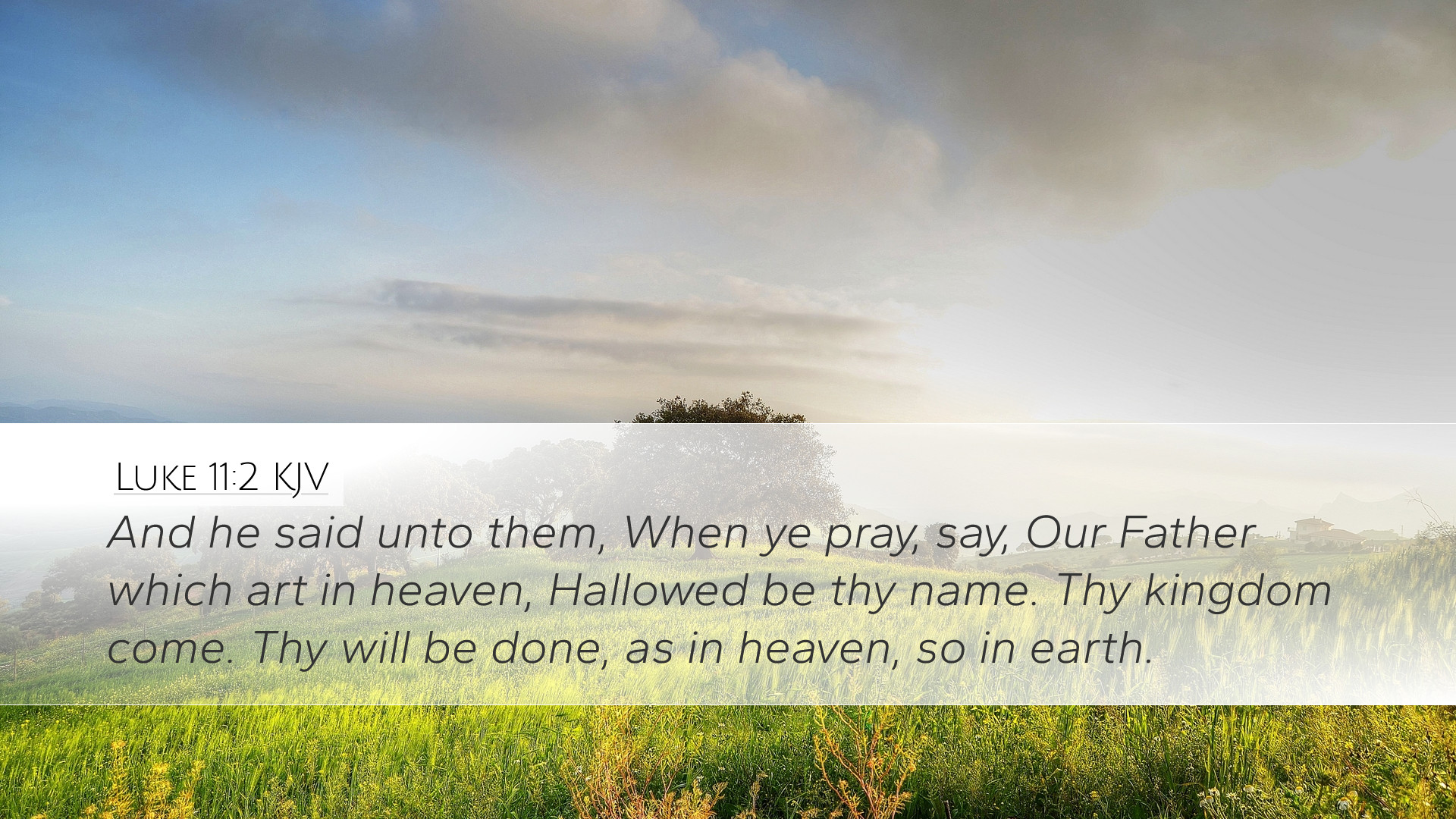Bible Commentary on Luke 11:2
Introduction
Luke 11:2 serves as a pivotal verse where Jesus teaches His disciples how to pray. This instructional moment not only shapes the manner in which Christians approach prayer but also reflects the nature of their relationship with God. In this commentary, we will amalgamate insights from renowned public domain commentaries, including those by Matthew Henry, Albert Barnes, and Adam Clarke, to provide a deep theological understanding of this verse.
The Text of Luke 11:2
“And he said unto them, When ye pray, say, Our Father which art in heaven, Hallowed be thy name.”
Exploring the Context
The setting of Luke 11:2 is crucial for understanding its meaning. Jesus had just been teaching about the importance of prayer and the necessity for persistence and sincerity. The disciples, recognizing the authority with which Jesus prayed, sought to learn from Him. This highlights the significance of prayer in the life of a believer.
Commentary Insights
Matthew Henry's Commentary
Henry emphasizes that this verse embodies the essence of prayer, illustrating both its address and its purpose.
- Addressing God as Father: Henry notes the intimate relationship believers have with God. In addressing God as "Our Father," there is a recognition of His paternal care, love, and authority, which cultivates a sense of belonging and intimacy.
- The Holiness of God's Name: The phrase “Hallowed be thy name” signifies reverence and awe towards God. Henry explains that this establishes the tone of prayer as not just a request for needs but an acknowledgment of God’s holiness and sovereignty.
- The Community Aspect: The use of "Our" indicates a collective dimension of prayer, affirming that believers pray not just as individuals but as part of the body of Christ. This community aspect fosters unity among believers.
Albert Barnes' Notes on the Bible
Barnes gives an exegesis of the significance of this verse, outlining the theological implications of the prayer that Jesus taught.
- Universal Fatherhood: Barnes points out that by calling God "Father," Jesus invites believers into a universal acknowledgment of God's sovereign rule. This fatherhood also implies God’s willingness to listen and respond to His children's prayers.
- The Nature of Prayer: Barnes elaborates that prayer is a means of communicating with God and that Jesus teaches the need to approach God with reverence and earnestness.
- God's Kingdom: Barnes highlights that this prayer establishes God’s authority and announces the goal of advancing His kingdom on earth. The phrase “Hallowed be thy name” is a petition for God’s holiness to be recognized and revered among all nations.
Adam Clarke’s Commentary
Clarke’s interpretation delves into the implications of this prayer for practical living and spiritual discipline.
- The Example of Christ: Clarke asserts that Jesus' example in prayer illustrates the balance of grace and reverence. Christians should feel bold in approaching God while simultaneously recognizing His majesty.
- Implication of the Name: The name of God holds great significance, representative of His character and attributes. Clarke emphasizes that to hallow God’s name means to treat it with utmost respect and to live a life that reflects His holiness.
- Calling for Righteousness: Clarke concludes that this prayer includes a call for righteousness. When invoking God’s name, believers are reminded of their duty to embody His virtues in their personal conduct and communal interactions.
Theological Themes
Several theological themes emerge from Luke 11:2 that carry profound implications for pastoral ministry, theological study, and personal faith. These include:
- Intimacy with God: The relational aspect of prayer as a conversation with Our Father opens avenues for vulnerability and honesty in one’s communication with God.
- Reverence in Prayer: The dual essence of familiarity and honor underscores the need for a balance between intimacy with God and the recognition of His holiness.
- Community in Faith: The collective pronoun “Our” serves as a reminder of the communal nature of faith and prayer, inviting believers to intercede for one another and build one another up in faith.
Application for Today’s Believers
In light of the insights gained from the commentaries, what practical applications can believers draw from Luke 11:2?
- Prioritize Prayer: Christians are encouraged to develop a habit of prayer that reflects the model Jesus provided, integrating both praise and petition.
- Cultivate Reverence: Acknowledge the holiness of God in all aspects of life, ensuring that His name is honored in both speech and action.
- Engage in Community: Foster a spirit of unity among believers, recognizing the power of collective prayer in achieving God’s purposes on earth.
Conclusion
Luke 11:2 provides a fundamental framework for prayer, rich with theological truth and practical implications. As believers understand and apply the teachings of Jesus, they can deepen their relationship with God, honor His name, and live out the call of discipleship in community. This analysis, enriched by the perspectives of Matthew Henry, Albert Barnes, and Adam Clarke, invites pastors, students, theologians, and Bible scholars to reflect continually on the profound nature of prayer in their spiritual lives.


